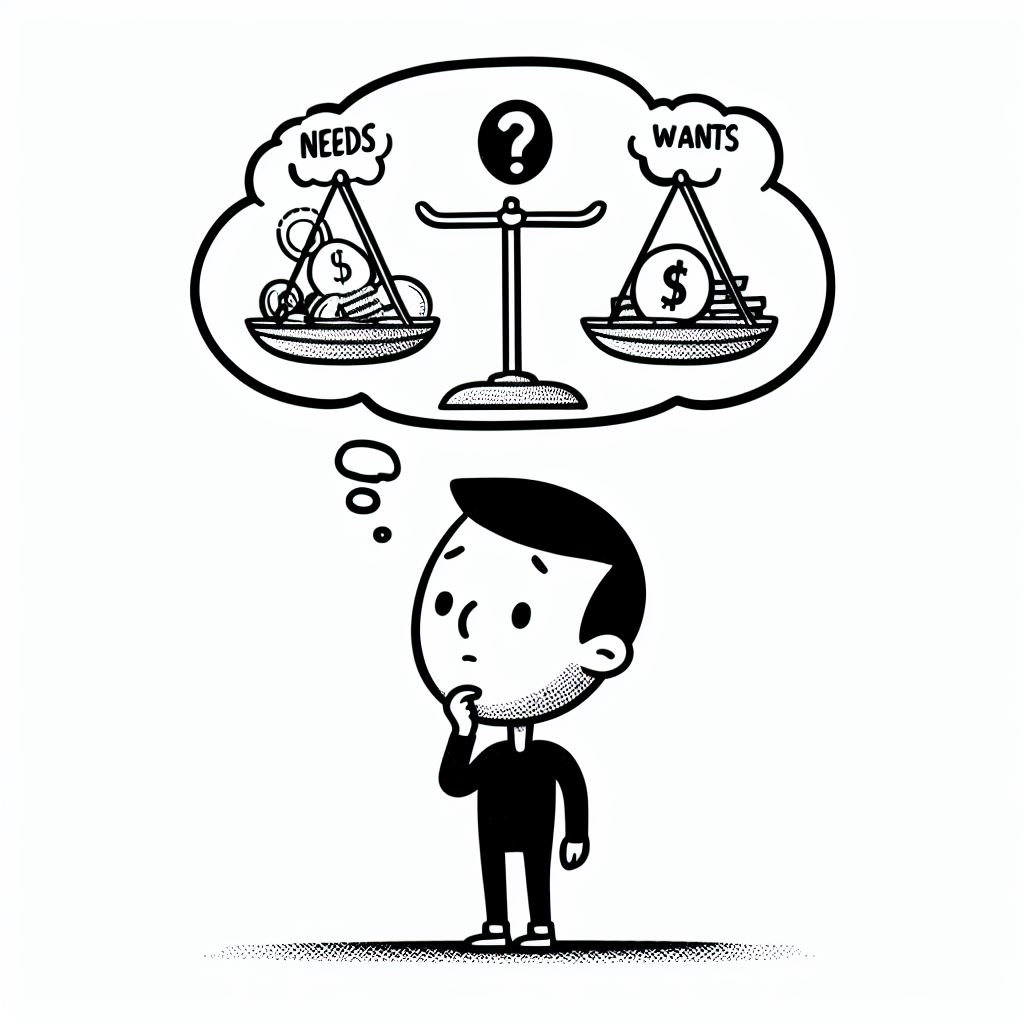To maintain financial balance, distinguish between needs and wants, create a budget, establish an emergency fund, set clear goals, prioritize savings, wait before large purchases, research, avoid lifestyle inflation, and practice mindful spending. Emotions can occasionally lead to splurges, but they should be exceptions, not the rule. People's spending habits vary based on individual priorities and goals.
___________________________________________
“I’m interested to hear how you all manage and balance your personal “needs” and “wants” from a financial perspective when it comes to bigger purchases. When have you let your emotions take over and bought something that wasn’t smart financially but you really just wanted it? For example, only needing a $10-15k daily driver vs wanting a $50k car that you can afford but it doesn’t financially make sense. Or, only needing your current phone that works fine vs wanting the latest flagship model which might be faster and take better photos but isn’t financially a good decision. What’s interesting is in this sub when someone mentions cars it seems like everyone drives $10-15k cars. But when the annual ‘whats your salary’ thread comes up it seems like a lot in here are on good money. So either everyone in here is really smart with their money or they’re not saying what they splurge and indulge on..”
(Original question on Reddit)
___________________________________________
Balancing your needs and wants financially can be challenging, but it’s essential for maintaining a healthy financial life. Here are some recommendations and advice on how to do so:
Distinguish Between Needs and Wants
Before making any purchase, ask yourself whether it’s a necessity or a desire. Needs are essential for daily life, while wants are nice to have but not crucial. By being aware of this and asking yourself this question before any purchase, you could avoid impulse buying and spending money on things you don’t really need. Recognise when emotions are driving your spending decisions. Take a step back and evaluate whether the purchase aligns with your financial goals and if it is a necessity.
Budgeting
Create a budget that accounts for all your necessary expenses (needs), such as housing, food, bills, insurance and healthcare. Then, allocate some of your remaining income to discretionary spending (wants). This can help ensure you’re meeting your basic needs while still allowing for some enjoyment.
Emergency Fund
Establish an emergency fund to cover unexpected expenses. Having this financial cushion can reduce the temptation to dip into your savings or go into debt for non-essential purchases. It’s good to aim to have enough money to cover at least 3 to 6 months’ worth of expenses.
Set Clear Goals
Define your financial goals, both short-term and long-term. Knowing what you’re saving for can help you stay focused and disciplined. For example, if you plan to purchase your first home in the next couple of years, you would want to maximise your savings towards your home. Therefore, you probably would not want to spend money on things you don’t need, such as a really expensive car during this time.
Prioritising
Contribute regularly to your savings and investment accounts before considering discretionary spending. Automated transfers can make saving effortless. Additionally, once you have prioritised your needs and savings, you can list and prioritise your wants. This can help you decide which purchases are most important to you.
Waiting Period
Implement a waiting period before making large purchases. This can give you time to consider whether the item is a need or a want. If, for example, 30 days, you still feel like you really want that item, then you could consider getting it. This method will allow you to avoid impulse buying.
Research and Compare
Before making a big purchase, research and compare options. Explore alternatives that may meet your needs at a lower cost. This can help you find the best price and determine whether the item is worth the cost.
Avoid Lifestyle Inflation
As your income grows, resist the urge to immediately increase your spending on wants. Continue prioritising savings and financial stability, and occasionally treat yourself. Try not to make it a habit of splashing your money on anything you want just because you are earning more now, as this will damage your finances in the long run.
Mindful Spending
Practice mindful spending by being aware of where your money goes. Track your expenses to identify areas where you can cut back. You can use budgeting tools online to help you with this and track where you spend your money every month.
As for letting emotions take over, it’s natural to occasionally splurge on something you really want, even if it doesn’t make the most financial sense. The key is to ensure these instances are the exception, not the rule, and these purchases are in moderation, within your means, and don’t jeopardise your financial security or long-term goals.
Regarding your observation about the discrepancy between people’s salaries and their spending habits, it’s possible that those with higher incomes are prioritising saving or investing their money rather than spending it on expensive items. Everyone’s financial goals and priorities differ, so what works for one person might not work for another. Ultimately, financial balance comes down to setting priorities, clearly understanding your financial situation, and making intentional choices that align with your values and objectives.
Hope this helps.
Regards, Clive Fernandes (Financial Adviser)
Director – National Capital
Disclosure: I am the director of National Capital, a KiwiSaver advice firm. The views expressed in this article are the views of the author. The information provided is of a general nature and is not intended to be personalised financial advice. You may seek appropriate financial advice from a Financial Adviser to suit your individual circumstances or contact National Capital.
